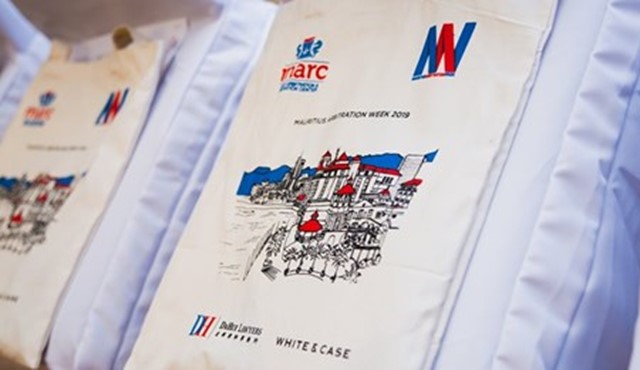Business updates
For a second consecutive year, the Mauritius Arbitration Week (MAW) gathered local and international practitioners, investors and financiers for a series of conferences, seminars and networking events. The MAW is an annual event organised by MARC, an institution set up by the Mauritius Chamber of Commerce & Industry (MCCI). Over the last couple of years, MARC has spared no effort in its determination to become the region’s top dispute resolution centre with the endorsement of several reputed international practitioners, many of which are members of the MARC Court (presided by Neil Kaplan QC) or the MARC Advisory Board. MARC also completely revamped its arbitration rules in May 2018, which are available in English, French and Chinese, and incorporate a series of sophisticated features.
The MAW took place between 10 and 14 June 2019. The central theme to this year’s event was Mauritius: a bridge between Africa and Asia.
The panellists focused to a large extent on the surge in the Africa-Asia trade, which is already giving rise to a significant volume of disputes in the region. While London, Paris and Geneva remain for now the top 3 jurisdictions used for the resolution of those disputes, there is an increasing trend towards their regionalisation and a preference for more cost-efficient jurisdictions and arbitral institutions. Singapore and Hong Kong have already experienced this trend: according to the Queen Mary University Survey, the aggregated preference for these jurisdictions is greater than for London or Paris, which is a significant shift in the mindsets of investors from two decades ago.
The consensus among panellists was that Africa is catching up with this trend. Amongst various initiatives, the Chinese-African Joint Arbitration Centre (CAJAC) was established in 2015 for arbitral institutions in the region to share a platform for training and marketing, as well as fostering cultural familiarity with the different jurisdictions. While the initiative is promising, some of the panellists expressed some reservation at how CAJAC is going to develop amid the arrival of so many African arbitral institutions. Further, there is a wrong perception from the investment community that there are not enough competent arbitrators of African nationality with experience in cross-border disputes; the aim of another initiative, the African Arbitration Association, is to dispel that perception by increasing the visibility of African arbitrators on international platforms. In addition, the entry into force of the African Continent Free Trade Area (AfCFTA) on 30 May 2019 is expected to increase intra-Africa trade, particularly among SMEs, as well as the resolution of their disputes in accordance with the protocol that has been negotiated as part of the CFTA framework.
Panellists also agreed that Mauritius is recognised as the largest contender for being selected as an African seat due to its ease of doing business, cultural diversity, pro-arbitration judiciary, and its credible financial and administrative institutions. The geographical proximity of Mauritius with Africa and India, together with its strong ties with China, make it the perfect neutral seat. Mauritius also continues to attract significant foreign investment, partly due to the sophisticated Investment Promotion and Protection Agreements (IPPAs) and Double Taxation Avoidance Treaties (DTAs) that it has concluded with several countries, and it has become the natural forum for the resolution of disputes arising from those investments. For example, at a seminar hosted by the Mining and Energy Club during the MAW, panellists discussed the significant role that Mauritius plays in the African mining industry: more than half of the investment into mining in Africa is held in or through funds incorporated in Mauritius. Arbitration becomes an important tool in limiting or mitigating the risks that arise in those investments, and the availability of a pro-arbitration framework in Mauritius is an important factor for investors and their financiers.
However, the conclusion of the discussions held during the MAW was that the regionalisation of disputes in Africa is expected to take time, but Mauritius has made a head start with the implementation of its International Arbitration Act a decade ago, and the emergence of MARC as an arbitral institution that administers disputes in English and French, two languages that are widely used on the African continent. The development of the jurisdiction and its caselaw is also being closely watched by fellow practitioners in neighbouring countries that have recently brought amendments to their own arbitration legislation: for example, South Africa introduced its international arbitration legislation a year ago, and India brought important changes to its legislation in 2015 to include certain features that make arbitration more appealing. More recently, the judgment of the Supreme Court of Mauritius in the Betamax saga attracted significant interest from the international community in the circumstances where the Mauritius court set aside an arbitral award on the ground that it was contrary to public policy a few days after the Supreme Court of India had ordered the Mauritian state-owned award creditor to pay security for the amount of the award pending enforcement proceedings in India.
A number of seminars during the MAW were hosted by local and international law firms. Panellists discussed inter alia the significance of nationality and gender diversity in the selection of arbitrators, the challenges in the recognition and enforcement of arbitral awards in Africa, the development of third-party funding on the continent, and the changes brought to Sino-African bilateral investment treaties over time. The MAW also consisted of industry-specific seminars. Panellists on the seminar on construction arbitration in Africa and Asia agreed that the familiarity of the Mauritian jurisdiction with both civil and common law systems and cultures gives it an edge over its competitors to become the ideal place to arbitrate construction disputes, although the country needs more specialist arbitrators and experts. Another seminar considered the mining industry in Africa; the seminar was preceded by the signing of a Memorandum of Understanding between MARC and the Mining & Energy Club for greater cooperation between the two organisations.






